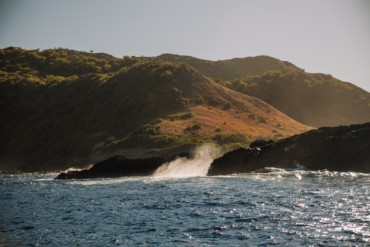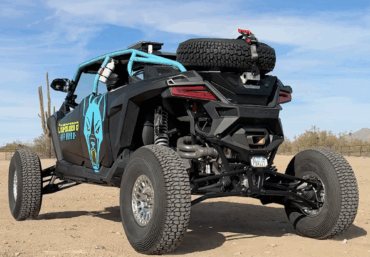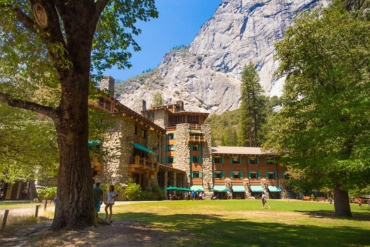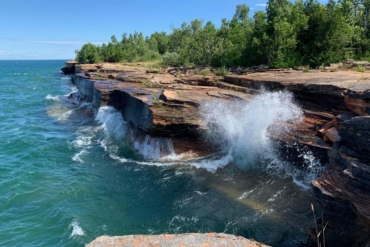Packing mules and horses is a tradition as old as domestication of the equine sort. GearJunkie’s Nicole Qualtieri spent a weekend digging into the American West’s take on how to pack mules and horses with the Royal Tine Guide School.
The last time I packed a mule into a wild place was in 2007 for a packing and outfitting class at Colorado State University. Since then, I’ve added big-game hunting to my skillset, and I’ve been itching to combine my horsemanship with my huntsmanship in the backcountry.
But it’s been a few years since those collegiate days weighing out loads and setting a pack-saddle on a mule. With my own little horse coming along in her training, I knew I needed more than a refresher to feel prepared to pack her for the coming elk season, summer fishing trips, and beyond.
A weekend course on packing mules and horses with the Royal Tine Guide School seemed to be just what I needed to get back on the right track.
Packing Mules With the Royal Tine Guide School

A friend of mine clued me in to the Royal Tine Guide School‘s weekend course, set up for folks like me looking to learn the basics. And owners Cody and LeRee Hensen are no strangers to the deal. They’ve been teaching the ways of backcountry hunting camps to all sorts of people since 1994.

In addition to the weekend course, they run a 4-day dutch-oven cooking course, a 2-week camp cook school, and a 4-week guide school for people looking to get into the guiding and outfitting business as a profession.
The school is located on a beautiful parcel of the Hensen family ranch on the outskirts of the Sapphire Mountains near the historic mining town of Philipsburg, Montana. People from all over the country attend their courses. Our small class brought men and women from South Dakota, California, Wisconsin, Idaho, and Montana.
And their spot is home to more than just the guide school. They run a venerable outfitting business as well. Hunters come to hunt everything from elk and deer to mountain lions. Not only are they longtime hunting guides, packers, and outfitters, but both Cody and LeRee are also experienced houndsmen. We had the pleasure of sharing camp with their newest addition: an 8-week-old black and tan hound named Cinder.
Deckers, Sawbucks, Manties, and Manty Ropes

The 3-day class covers the basics of packing the two main types of pack saddles: deckers and sawbucks. A decker saddle uses metal loops on its tree (seen above) whereas the sawbuck is made of wooden crossbucks.
We learned how to pack mules and horses with both types of saddles over the weekend, but Hensen’s focus is on packing the decker. Robust and versatile, the hoops of the decker can be modified to fit individual horses, can hold specially made boxes for packing called panniers, and can be specifically tied to hold mantied loads.
Manties are swaths of treated or untreated canvas that typically measure 7 x 8 feet. Using a 35- to 38-foot manty rope, a packer can pack anything in a mantied load from hay bales to a variety of duffels to elk quarters. Hensen’s educational ingenuity has led to a few unique inventions, like the makeshift elk quarter packed in a manty, shown below.
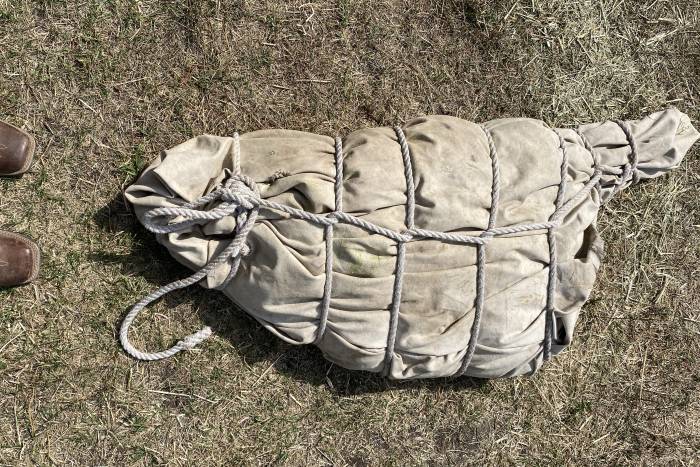
We practiced on all sorts of loads, from a propane tank to sleeping bags and duffels to fishing rod cases and camp chairs.
So Many Knots
The harsh reality of being surrounded by mules, pack-saddles, rope, and items in need of a packing steed is that it’s all gotta be tied up somehow to something.
Much of the 2 days in our outdoor classroom was spent tying knots, putting up ropes, and practicing varied mantied loads. Many of the knots we learned were quick-release knots, designed for a swift pull in case of emergency.

We learned a series of knots, and if you’re interested in learning the same, you’d do well to practice the following:
- Packer’s knot
- Bowline knot
- Quick-release latigo knot
- Trucker’s hitch
- Bank robber’s knot
- Timber hitch
- Basket and barrel hitches
- Crow’s foot hitch
- Half-hitch
A few patient mules and horses stood quietly and patiently as we fumbled around them, tying knots both correctly and incorrectly throughout the weekend. The Hensen’s four-leggeds are clearly used to the disarray of packing rookies; they never once issued a complaint against us by hoof or nip.
Hensen himself was just as patient. He walked me and my classmates back when we did something wrong, showing us the right way when the brain often fuzzed over in a tangle of rope.
High-Country Happiness, Real-Time Education

I’m a rural-born Midwestern kid, turned cityfied urbanite, turned back to the rural with mountain proclivities. Stepping into the Hensens’ camp was akin to stepping into the kind of paradise I’d rather occupy. Canvas walls, wood-fired stoves, coyotes and owls singing at night, golden leaves tipping out the quakies with fall on the cusp.
On the first morning, I caught Hensen bringing his herd in from a night of grazing into the corral, golden light and dust from the four-leggeds edging the view.

It’s the kind of thing that’s just a part of the daily chores at their working camp. And it brought to mind my time working on ranches and around all sorts of horses in my 20s. It’s easy to be wistful and pulled in by the beauty, but it’s a very real kind of work that calluses hands and requires a strong back and even stronger fortitude.
And for me, the benefits of the gained experience certainly outweigh the difficulty of packing equines. It might be a simpler process to shove an elk quarter into a backpack and huck it out step by loaded step, but with a little extra knowledge and preparedness, I’m happy to have my horse carry the bulk of the weight out for me and add another layer of skill to the journey.
I’ll add that the workload is not decreased on a whole by bringing these animals along for the ride. If anything, it’s more of a haul. But when packing mules and horses, you can go farther, take a bit more for the journey, and have a very large four-legged friend to help lighten your load.
A Crash Course Worth Taking

We ended the weekend with a working exam. On Friday morning, we loaded up mules with all sorts of stuff. We hopped onto Hensen’s steady-eddy horses, then hit the trails for a few hours to test our loads.
Surprisingly, not a load tipped. No saddles rolled. No steps were mistaken. And we made it through the ride in one piece.
The crash course in packing these animals was well worth the $500 I paid out of pocket for the experience. Tying a hay bale onto a horse for the first time is a definitively humbling experience. And the team effort stretched across our little group. Beyond basic packing, we talked equine first aid, backcountry horse care, and how to prepare when things go wrong.
Murphy’s Law seems to be written into the relationship between humans and horses. Hensen often reminded us that it wasn’t “if” something would go wrong, it was “when” something would go wrong.
And that sentiment was the reason that I took a course on packing mules and horses in the first place. The last thing I wanted to do was put myself and my horse in a precarious position.
After a few days with the Hensens, I’ve got a few fundamentals in my back pocket that I can put to use. And, hopefully, an ounce of prevention is well worth that pound of cure. The elk are bugling in a few corners in Montana.
Perhaps my equine partner and I will complete our first pack-out this year, brow tines, half-hitches, and all.
Royal Tine Guide School offers three of these weekend offerings throughout the year. You can find 2021 dates for all courses here.



